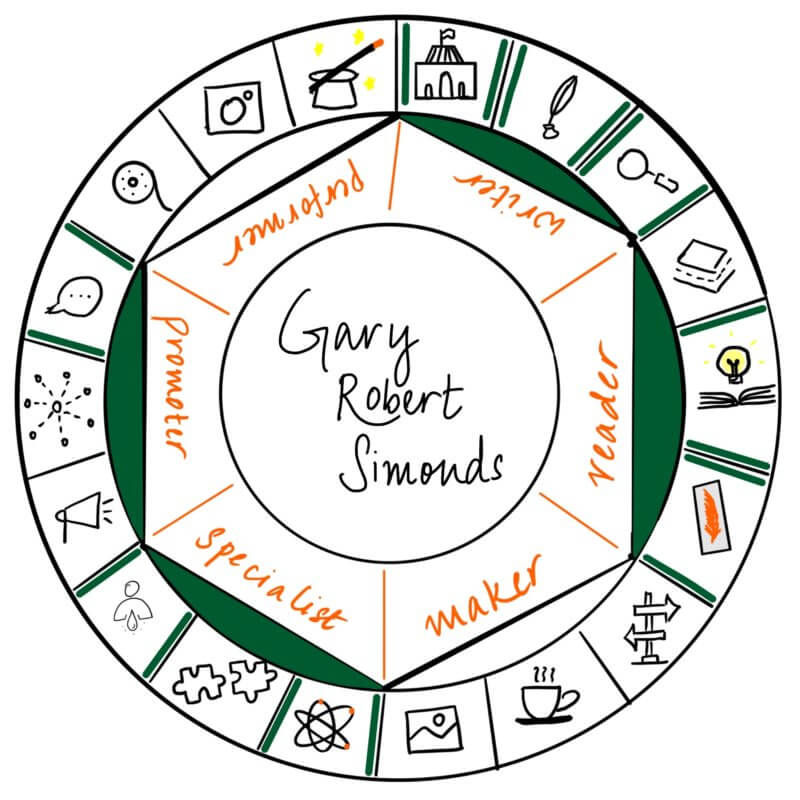Welcome friend! I have an insatiable thirst to learn about the variety of professions and careers that we humans pursue. Gary R Simonds, author, surgeon and educator, connected with me about his latest book, Death’s Pale Flag. It is a psychological/medical thriller with horror elements. While I can’t wait to read it and discuss it with Gary, I thought it would be a great opportunity to learn about being a neurosurgeon through this series.

Hi Gary! Welcome to Armed with A Book. It is a pleasure to host you on the blog! Can you please tell me and my readers about yourself?
I am a guy, getting on in my years, with a huge diversity of interests. I spent a career as a neurosurgeon at major medical centres, doing thousands of brain and spinal operations and seeing tens of thousands of severely sick and injured patients. I retired from surgery a little earlier than planned due to some medical problems so refocused my energies on teaching and advising undergraduates and medical students at Virginia Tech, giving talks on numerous subjects, and writing both novels and non-fiction. I am very interested in burnout and psychological distress, medical ethics, education, the delivery of healthcare in America, and the interface between science and religion. I’m also a soccer fanatic (favourite team – Manchester United), a banjo and guitar player (I plan to take up the bagpipes soon), and enjoy a good political discussion new and then. I live with my wife, Cindy, and border collie, Hamish in Black Mountain North Carolina where we spend much time hiking and soaking in the great outdoors.
When did you decide to become a neurosurgeon?
I went through a lot of possible specialties in medical school. I was going to be a family practice doctor first, then an oncologist, then a general surgeon, then a cardiothoracic surgeon. In my last month of medical school, with everything set up to start a residency, I saw my first brain operation and said “I my gosh, I’ve got to do that.” So, after switching horses in midstream, I leapt into a neurosurgery residency at Walter Reed and never looked back. Not the most judicious move-it was a big leap- but it worked out!
As kids we generally start with a very superficial idea of what a profession looks like. What did you imagine being a neurosurgeon to be like and what did it turn out to be in reality?
Oh boy is that a loaded question. I didn’t know much at all about neurosurgery when I made the switch. After the one operation I saw, I thought “man is that just too cool – to be able to work on the “set of the soul” on the organ that makes us, us, and bring the patient safely back to consciousness and full function. I pictured neurosurgeons as doing a few of these operations every couple for weeks and spending a lot of time recovering from them (the stress and physical toll. Man was I way off base. It’s been said that joining neurosurgery is like steeping onto a speeding train and boy oh boy were they right. It is a mile a minute every day, with disasters and horrible things coming one’s way non-stop every day and night. Terrible accidents, severe brain and spine injuries, tumors, strokes, hemorrhages, aneurysms – really, one human tragedy after another – and so often in the middle of the night. It’s a test of one’s endurance and emotional resilience – you feel so deeply for your patients and their families. And, there really is very little time to recover between patients.
What specialised education does one need to become a neurosurgeon?
Well, one needs to get into and then through medical school first (and expected to do very well there too). Then neurosurgery training is at least a seven year process after you graduate from medical school in what is known as a “residency.” There you work principally in a very busy major medical center under the tutelage of a team of “attending” neurosurgeons learning how to care for patients well before and after surgery as well as learning how to do surgery on the brain, the spine and spinal cord, and the nerves in the arms and legs. In my day, one spent 100 to 120 hours in the hospital per week – usually losing a complete night’s sleep every second to third night without the following day off, with very few days off in the year. You were forever sleep deprived and pretty exhausted. Training is somewhat more humane now with a limit of 80 hours per week allowed in the hospital and part of the day off the day following a night of “call.” When home in the “old days” and now, you also had to read about and study all the science and theory behind what you were doing. You would do this at night after you got home from the hospital. A few years after training, you also have to pass a pretty gruelling several hour oral examination to finally become a “board certified” neurosurgeon.

What does your everyday life as a neurosurgeon look like?
Ha! That is in part what my book explores. It can differ for different neurosurgeons depending where they practice, in what type of setting they practice, and what they might subspecialize in. It can be very hectic and time consuming. I worked in level 1 trauma centers so it went something like this: You get up pretty early, get to the hospital by 6:15 or earlier, visit your sickest patients first and make sure they are holding their own, then visit your first operative patient for the day in the pre-op area. At 7:00 you have to be in the operating room helping your patient for surgery which can take anywhere from 15 minutes to an hour. You do some sort of surgery (I liked to do my most complex brain surgeries first thing in the morning). These could take anywhere from 1 to 10 hours. After surgery you bring your patient to the recovery room, speak with their family, dictate and write notes about the operation, then go see your next surgical patient. I usually did 2-5 operations in a day. In between surgeries you would go see more of your patients, field phone calls and pages, and perhaps see consultation patients. This would go on all day. I usually got out of the hospital between 6 and 8. On “call” nights (and weekends), though, you would be available all night to the hospital for all emergent and urgent consultations. You usually saw 5 to 20 of these in a night and sometimes had to take them emergently to surgery. 1-2 days a week I would see patients in our clinic every 15 minutes from 8 to 5 or 6.
What’s your favorite part of the job?
Oh, many things. I loved trying to help people at some of the most desperate points in their lives. I loved helping patients and their families deal emotionally with their situations. I loved the intellectual challenge of figuring things out in terms of what was going wrong for the patients. I loved the collegiality with everyone on the healthcare team. I loved the fact that you were ALWAYS improving in what you were doing. I loved the nervous system in all its complexity – always learning something new about it. I loved being on the forefront of medical technology. I loved witnessing the unbelievable grace and bravery of our patients and their families – they are ALWAYS so very inspirational. I loved teaching the future generations of physicians, neurosurgeons, PA’s, nurses, etc. I loved the adrenaline rush of leaping into a horrible emergency and actually being able to do something about it. I loved the dedication of all the healthcare personnel around me. I loved being part of a super tight knit group of professionals. I loved the embraces of grateful patients and family members. I loved watching a child wake up okay from a dangerous operation. Also a lot of fun is that each patient presents to us a mystery – what is going on with them, how are we going to navigate the perilous dangers of their care, how are we going to get them safely through their experience, etc.. So, we get to kind of be super detectives in their care.
What kind of challenges do you face as a neurosurgeon?
Ha! Again – that is what the book is about! The lost sleep is a major challenge. I’m not sure I’ll ever fully recover from it. I hated all the time separated from my family – those scars run deep. Many neurosurgeons also see a lot of horrible stuff – much death and tragedy, much human suffering. It can wear down the best. Neurosurgeons also have to deal with a lot of super dangerous operations where things don’t necessarily always go well. Even without any “mistakes” patients can do very poorly. So neurosurgeons have to face a lot of “bad outcomes” which can mean major neurological deficits, coma, and even death. No matter the cause of the bad outcomes, most neurosurgeons will blame themselves for at least part of them. They will often replay a surgery that went poorly in their heads for weeks. When a neurosurgeon believes they played a part in a major “complication” or bad outcome, they can be torn apart by it for quite some time. Neurosurgeons also have to dispense a lot of very bad news – day after day – often, many times a day – it takes its toll. Neurosurgeons also have to think about lawyers and lawsuits. It is said that the average neurosurgeon gets sued every two or so years. I also think neurosurgeons have to learn to dampen their emotional selves so they can go from one disaster to another and keep doing their job. I think this is not healthy at all.
How do you keep up with the latest advances in neuroscience? Are there other fields in medicine that you keep an eye on?
Oh my gosh – sooooo many. All our technology is really advancing at a break neck pace. I think “minimally invasive surgery” is becoming very big in neurosurgery where most of the surgery is done through very small openings or none at all. Then there is a lot of procedures that are being done through super thin and super controllable catheters fed all the way up into the vessels of the brain for various pathologies. Then there is the whole field of “functional” neurosurgery where electrodes are planted into the brain to control things such as parkinsons disease, severe tremors, certain kinds of seizures, and other conditions. I think this will be a major “growth industry” where more in more is done with brain/nervous system to computer interfaces. Tremendous things are also being done in the world of paralysis by hooking up such systems to robotics. Then there are real breakthroughs coming along in the pharmaceutical management of many diseases like various cancers and MS. For example. MRA vaccines may be a huge inroad to better treatment of various tumors. Oh – so much stuff that it is hard to keep up. As far as other fields, all I can do is “hang onto the rails” and go the ride. I skim several medical journals daily, but can’t get too deep in the weeds.

What got you interested in writing stories about your profession?
I have read several very good books on the world of neurosurgery but they can be a bit didactic. I wanted to try to immerse people more in that universe. I have to think that for many people, it will be a pretty strange place! I also have a very strong interest in psychological distress in healthcare workers. I have studied it for over 10 years and have co-authored three books on the subject with a world renown clinical psychologist and expert on it. I wanted people to understand that their caregivers are human beings too and care so deeply that it takes a toll on their psyches. Again, I wanted an immersive experience for readers – what it’s like to take care of some of the sickest patients in a hospital, to handle a major trauma, to get control over a terrifying complication in the operating room, to break terrible news to a grieving family. I also love ghost stories, thrillers and mysteries so I married them up! I’m hoping to challenge the reader to consider what is more terrifying – the supernatural world or the natural world (of a modern medical center).
Do you like to read? How do you find time for it in your daily routine?
It helps to be an insomniac! I often read in the very wee hours of the night. I think I got into the habit in medical school and residency and now do it much more for pleasure. I’ll often read for 2 or more hours in the middle of the night. I read medical stuff during the actually day – mostly on the computer.
What kind of books do you like to read? What book (or books) are you currently reading?
Favorite topics include: history, science, biographies, historical fiction, detective mysteries thrillers, and the paranormal. I am currently reading Bono’s autobiography (I love music and play the guitar and banjo). Also, White Noise. And I always have a Shakespeare play at my bedside (I’m a bit of a Shakespeare nut).
Is there anything else you would like to share about yourself and your books?
After so many years in big medical centers – watching so many lives be so brutally and severely disrupted, it is a wish of mine that we ALL slow down a little, appreciate our loved ones, friends, and fellow beings a little more, be kinder to and more tolerant of one another, lend a helping hand more, smile more, appreciate the world around us more and all the blessings we enjoy, and reach out more to those around us who aren’t experiencing such blessings. It all can change in a split second, at any time. Our time on earth is so short and so precious, it would be fantastic if we all could soak it in more and joyfully share it with others.
Sorry to be preachy on that one – but you asked!
If you could give a shout out to someone(s) who has helped in your author journey, please feel free to mention them below!
Oh my gosh – so many. My wife is a saint. She has put up with me since well before medical school (and I am far from a saint). She’s been with me throughout all that neurosurgery could throw at us. And when I write, I am pretty darned non-communicative for many, many hours on end. She is also a great critic and developmental/copyeditor. I have three amazing and caring sons who likewise put up with an overly-intense workaholic dad. I have a wonderful granddaughter who deserves much more of my time and attention. Then I have my co-author on my non-fiction books, Wayne Sotile, who taught me sooo much about burnout and psychological distress in healthcare workers. And many friends who may recognize pieces of their personalities in characters in my book. And finally, all my patients and their families who were always so much more brave, resilient, and full of grace than I could ever imagine being.
Thank you so much for your time! 🙂
Thank you!
If you have any questions for Gary, pop them in the comments below. We love hearing from you!
Thank you for hanging out with us today. Connect with Gary on Twitter and Facebook.
Links to check out:
Posts in The Creator’s Roulette offer insights into other professions, many articles covering writing. Most recently, I had chatted with Chloe Wilson about knee arthritis.
A medical thriller I enjoyed was Lost Immunity by Daniel Kalla. I discussed with my author friend, Erynn.
Cover image: Photo on Unsplash

Be First to Comment